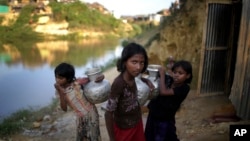The International Organization for Migration (IOM) reports the Rohingya refugee camps in Cox’s Bazar, Bangladesh, are fertile grounds for traffickers who prey upon vulnerable people. It says young women and girls in particular are lured into situations of forced labor and sexual exploitation.
An investigation by IOM staff has identified nearly 100 Rohingya refugees who have escaped abusive trafficking situations and returned to Cox’s Bazar. The IOM says these small numbers are only a fraction of those who have fallen victim to trafficking.
It says it is difficult to pin down the scope and scale of the situation because of its clandestine nature. Also, it says victims are reluctant to come forward because of stigma and fear of retribution.
IOM spokesman Joel Millman says girls sold into forced labor are the largest group of trafficking victims. But, he says adult men and boys also are targets of traffickers, accounting for around one in three of those ending up in forced labor.
He says traffickers lure vulnerable young people into dangerous situations with false promises of work and a better life.
“Individuals mentioned instances of girls and young women recruited for domestic work or hotel maids and became trapped into forced prostitution. Community members stated Rohingya women normally do not consider prostitution as an income-generating activity. But, the current lack of livelihood options forces some of the women to engage in survival sex,” he said.
Millman says the going price for cheap prostitution is six dollars, but the Rohingya women only get between 80 cents and $1.20 per service.
Nearly a million refugees live in Cox’s Bazar. Most have arrived since August 2017 to escape violence and persecution in Myanmar. The IOM says the refugees are barred from leaving the settlements and depend entirely on international aid for survival. It says the limited work opportunities in the camps, make the Rohingya easy prey for traffickers.




